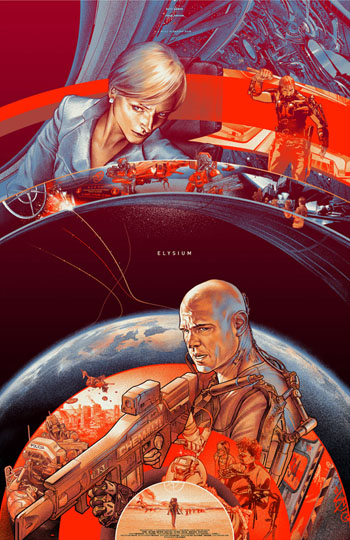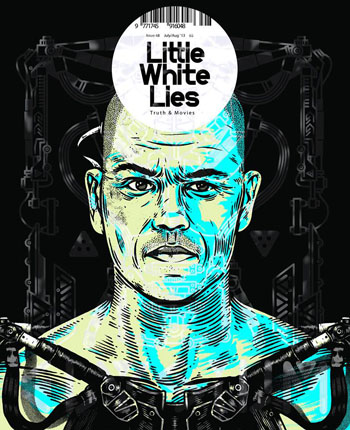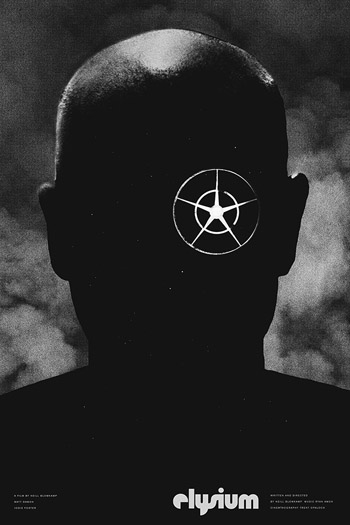“It’s been a dismal season at the box office for Hollywood blockbusters billing themselves as creative, original—anything but the standard summer sequel,” reports Brooks Barnes for the New York Times, citing R.I.P.D., After Earth, and White House Down as examples. “Now comes another film promising to take an imaginative detour from the familiar formula: Elysium, starring Matt Damon and Jodie Foster, from the director of District 9 [2009], Neill Blomkamp.” Here’s a film that “comments on present-day socioeconomic inequality by spinning a futuristic tale about a squalid Earth and a glorious space habitat where the superrich have retreated. There is no sex. There is no goofy sidekick. It will not be released in 3D. It is rated R. And the screenplay leaves questions unanswered, like how Mr. Damon, as an injured factory worker on Earth, survives a brutal back-alley operation to affix an exoskeleton to his spine and head. Don’t expect to see the obligatory camera shot of a ruined New York City.”
District 9 “was one of the few recent sci-fi/fantasy pics (along with Inception and Children of Men) that deserved to be called visionary,” writes Scott Foundas in Variety. “Here, Blomkamp delivers a less dazzling but nonetheless highly absorbing and intelligent, socially conscious bit of futurism, made on a much larger scale than its $30 million predecessor, but with lots of the same scrappy ingenuity…. Simmering or open class warfare has been a rich trope for sci-fi futurecasting as far back as Fritz Lang’s 1927 Metropolis and as recently as In Time, Total Recall, and Michael Winterbottom’s fine, underseen Code 46. Lang’s influence is particularly evident in Elysium’s army of industrious worker bees slaving away on the factory floor of the Armadyne corporation, whose slithery CEO, Carlyle (William Fichtner), developed Elysium and all the technology that makes it run…. Even working within a more conventional framework, Blomkamp again proves to be a superb storyteller.”
“Recalling Mad Max 2 (aka The Road Warrior) by way of WALL-E, Elysium is best appreciated as an intense, brawny, effects-heavy spectacle that benefits from Matt Damon’s sympathetic performance,” writes Tim Grierson in Screen Daily. “Unfortunately, the film’s higher aspirations—dramatic grandeur, political commentary—never come across as anything less than heavy-handed, more enjoyably overblown than genuinely captivating.”
For the Hollywood Reporter‘s Todd McCarthy, Elysium is a “politically charged flight of speculative fiction makes an exciting launch, only to tailspin into an ungainly crash landing.” And he blames “very deflating final act script problems that one would think could have been easily identified…. Blomkamp sets several narrative pots to simmering, promising much in the way of eventual direct conflict and potential intellectual complexity. Instead, the film narrows into a series of standard gun battles, explosions, mad dashes, close-calls, tough-guy fisticuffs, ridiculously fast downloading of massive computer files under maximum duress and, in the end, mawkish sentimentality. All the interest and good will built up by the sharply conceived preliminaries is washed away in a succession of scenes that feel crushingly routine and generic, not to mentioned guided by ideological urges.”
Update: “Science-fiction is, of course, often used as a vehicle to tell stories about the here and now disguised as tales of the future,” writes Alonso Duralde at TheWrap, “and lest anyone miss out on Blomkamp’s thoughts on contemporary immigration and health care, Elysium underlines and italicizes them before going over them again in yellow highlighter. Blomkamp is a master of creating action out of a grimy, quotidian kind of next-gen hi-tech, but when it comes to metaphors, he prefers the sledgehammer.”
Updates, 8/2: For the Playlist‘s Kevin Jagernauth, “one of the most refreshing aspects of Elysium is that Max is more John McClane than John McClane (especially now). While the film obviously dabbles in themes concerning the divide between the 99% and 1%, Max has no ambitions to be a hero for Earth, or even for his friends who could benefit from him breaching Elysium. His foremost concern is understandably selfish and simple: he wants to live.”
Blomkamp’s “fight scenes are exhilarating, beautifully paced, and impactful, and there are moments, visually, where one can nearly see the Alex Cox dream project lurking underneath the script’s earnestly heart-on-sleeve sheen,” writes Chris Cabin in Slant, “but it all ultimately feels a bit too safe. Elysium isn’t quite tough or brash enough to sell the cynicism Blomkamp pickles his story in, but his style has tightened, grown fleeter, meaner, and more direct in the wake of District 9.”
Update, 8/4: “Blomkamp echoes District 9 and its convincingly worn-down world of migrants and machines, employing an aesthetic of neon and grime, of metal and blood that brings to mind Verhoeven’s RoboCop and Total Recall,” writes William Goss at Film.com. “However, Blomkamp’s seemingly limitless imagination in terms of tech finds itself repeatedly and frustratingly grounded by heavy-handed storytelling. Frankly, Elysium is a bit of a liberal’s wet dream: the good guys want accessible healthcare, while the bad guys want to do away with undocumented immigrants…. As our own personal Jesus, Damon sells all sorts of futuristic fisticuffs and squinty-eyed determination over the course of this ultra-violent cartoon, but even he can’t save the fact that all this more ultimately feels like a whole lot less.”
Updates, 8/6: “At last, a good big film,” writes Anthony Lane in the New Yorker. “The legacy of the summer, thus far, has been jetsam: moribund movies that lie there, bloated and beached, gasping to break even. But here is something angry and alive.”
Indiewire‘s Eric Kohn: “Elysium takes its dark vision of a hierarchical future dead seriously, co-opting the sleek imagery of believable space ships and other gadgetry for the sake of a global rant against the privileged nature of expensive technology. Of course, that in itself serves as a wry indictment of the blockbuster process…. If Elysium is the brainiest Hollywood movie of the summer, it’s also the most conflicted one.”
Updates, 8/8: “It’s too bad,” finds Paul Constant in the Stranger, “that the second half of Elysium doesn’t even try to match the intelligent world-building of the first half. The social problems that the film allegorizes so eloquently at the beginning can’t be resolved by a fistfight on a catwalk with a sociopathic mercenary (Sharlto Copley, menacing at first, cartoonish by the end), but Blomkamp is so confident in his filmmaking powers that you want to forgive him for going Full Hollywood.”
“Luckily, the movie has as its hero Matt Damon,” writes Bilge Ebiri in the Nashville Scene. “Is there another action star who can be so consistently, compellingly vulnerable? As in the Jason Bourne films, he’s the guy who seems slightly out of his element yet possessed of deep inner strength…. Credit this scrappy, likable movie star, and an exceedingly smart first half, for making so much of Elysium so enjoyable—even if it doesn’t live up to its very grand ambitions.”
In the New York Times, Manohla Dargis agrees that “it’s the ease and sincerity with which Mr. Damon conveys moral decency—so that it feels as if it originates from deep within rather than from, say, God or country—that helps make him a strikingly contemporary ideal of what used to be regularly called the American character. That character is crucial to making Elysium work as well as it does for the simple reason that Mr. Damon’s performance helps keep the movie from sinking under the weight of its artfully constructed horrors.”
“As allegory, Elysium is less risible than its predecessor, in that it doesn’t equate apartheid victims to slimy space bugs,” writes A.A. Dowd at the AV Club. “But it’s ultimately even less concerned with the social issues it pretends to tackle; any focus on wealth inequality or the failures of the health-care system basically evaporates once the heavy artillery comes out.”
“Yet for all its simple politics, clanging dialogue, and underwritten roles,” writes Keith Phipps at Dissolve, “Elysium works, though never as well as it should.”
“Elysium is crap,” asserts Steve Macfarlane at the L. It “reveals itself as the skimpiest socialist tract, details-wise, since OWS.”
“Though Blomkamp recently told Entertainment Weekly that Elysium is about ‘now,’ I assume he can only mean it is about the way we make movies now, which is to say we prefer to remove all politics in favor of woo-y philosophizing about ‘the triumph of the human spirit,'” writes Michelle Dean at Flavorwire. “Which means that it misses the entire point of Blomkamp’s prior success.”
“The context and subtext are plenty imposing here,” writes Time‘s Richard Corliss. “What’s missing is the text: an engaging plot.”
“I enjoyed the film, but Blomkamp leaves too much hanging in orbit,” writes Robert Horton for Seattle Weekly.
Updates, 8/9: Illustrator Syd Mead, now 80, has worked on Star Trek: The Motion Picture, Blade Runner, TRON, Aliens—and Elysium. Introducing his interview with Mead for Vulture, Matt Patches writes, “His job wasn’t to “draw a spaceship,” but to “craft a reality.” Tangibility was key…. We spoke to Mead on teaming up with 33-year-old Blomkamp and his lifetime of imagining Hollywood sci-fi.”
“Like the alien apartheid in District 9, the division between ‘serious’ science fiction films and ‘mainstream’ SF flicks certainly exists,” writes Ryan Britt at the Awl. “But the actual boundaries between these kinds of movies might be fairly blurred. What’s more, it’s not clear any more if these science fiction movies even like science fiction.”
“Elysium is a highlight of the summer,” writes Salon‘s Andrew O’Hehir, “and makes clear that Blomkamp is a genuine visionary who’s trying to push the envelope of possibility in mainstream popcorn cinema.”
District 9 “did a lot with a little,” writes Slate‘s Dana Stevens, who finds that Elysium “does a little, sometimes shockingly little, with a lot…. It’s a waste of a perfectly good dystopia.”
“Blomkamp is a talented, loosely visionary director,” writes Wesley Morris at Grantland, “but, after two movies, it appears to be a limited vision. He’s stuck between real rebellion and real marketability.”
Elysium “won’t win many points for originality or logic,” writes Ben Kenigsberg at RogerEbert.com. “But when the blockbuster competition wants only new ways to repackage Wolverine and Superman, it’s weirdly refreshing to watch a film that seeks new ways to repackage Mad Max, Blade Runner, Robocop, and elements from Kathryn Bigelow and David Cronenberg.”
“[L]ike better science fiction, it’s an allegory that lines up parallels to the present moment, but doesn’t fuss so much over extended metaphor,” writes Ray Pride at Newcity Film.
Updates, 8/12: Blomkamp “has a refreshingly straightforward take on race, no doubt tied to his South African upbringing,” writes Jacobin contributing editor Gavin Mueller. “It’s a lot harder to talk about the ‘complexities’ of race and class, like the mainstream media likes to do in the States, when you were born in a country where only the white tenth of the population could vote or hold office. Class, of course, remains incredibly tied to race, connected to all manner of material privileges (including not getting gunned down by cops and vigilantes). That the oppressed classes stuck on polluted and underdeveloped Earth are almost entirely brown and black, while Elysium is full of WASPs, strikes me as a bit of political courage that rejects any lingering vestiges of the ‘post-racial America’ trop. That courage fails when it comes to the casting—Matt Damon was so wrong for this role that I wondered if the studios forced Blomkamp to hire a ‘bankable’ white lead…. Nor do I understand the gender politics of this film, which can only be described as abysmal. It’s 2013, and the film’s set in 2154, but we never once see a woman fire a gun, throw a punch, drive a car, work in a factory, or even drop an f-bomb.”
Sam Smith designs a new poster for the Dissolve.
“Has a movie ever broken your heart, Scott?” asks Tasha Robinson at the Dissolve. “I don’t want to be too melodramatic about my frustration over Elysium, but I think my disappointment, and even annoyance, merits at least a moment or two of clothes-rending and breast-beating.” And Scott Tobias agrees that “the new film fell short of the previous film in virtually every department.”
For news and tips throughout the day every day, follow @KeyframeDaily on Twitter and/or the RSS feed. Get Keyframe Daily in your inbox by signing in at fandor.com/daily.








